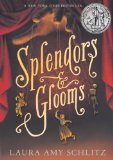Summary | Excerpt | Reading Guide | Reviews | Beyond the book | Read-Alikes | Genres & Themes | Author Bio

Winner of BookBrowse's 2009 Children's Book Award. When a fortuneteller's tent appears in the market square of the city of Baltese, orphan Peter Augustus Duchene knows the questions that he needs to ask: Does his sister still live? And if so, how can he find her? The fortuneteller's mysterious answer (An elephant will lead him there!) sets off a chain of events so remarkable, so impossible, that you will hardly dare to believe it’s true.
Winner of BookBrowse's 2009 Children's Book Award
What if? Why not? Could it be?
When a fortuneteller's tent appears in the market square of the city of Baltese, orphan Peter Augustus Duchene knows the questions that he needs to ask: Does his sister still live? And if so, how can he find her? The fortuneteller's mysterious answer (an elephant! An elephant will lead him there!) sets off a chain of events so remarkable, so impossible, that you will hardly dare to believe it’s true. With atmospheric illustrations by fine artist Yoko Tanaka, here is a dreamlike and captivating tale that could only be narrated by Newbery Medalist Kate DiCamillo. In this timeless fable, she evokes the largest of themes - hope and belonging, desire and compassion - with the lightness of a magician’s touch.
In a highly awaited new novel, Kate DiCamillo conjures a haunting fable about trusting the unexpected - and making the extraordinary come true.
Feeling separate is a universal experience. Too often these days, we live behind picket fences, or triple-locked doors. We live behind stone walls or lines in the sand. We live behind fear or worry. The Magician’s Elephant by Kate DiCamillo is a story about people who break through these barriers - a story brimming with connection and the hope, love and, yes, even magic that comes from those connections. On the one hand it's a magical, faraway fable, and on the other hand a very present and real story, both woven together in the seamless way that can only come from Kate DiCamillo...continued
Full Review
 (937 words)
(937 words)
(Reviewed by Tamara Ellis Smith).
The magician in The Magician's Elephant makes an elephant appear. But what about an elephant that disappears?

In 1918, Houdini made an elephant vanish from the middle of the Hippodrome Theatre in New York before over 5000 pairs of eyes. Jennie was an 8 foot tall, 6,000 pound Asian elephant and when Houdini brought her onto the stage she would raise her trunk as though she were saying hello to the audience, and then she would walk into a box on wheels - and disappear.
Who taught Houdini how to do this magic trick? And how did Houdini do it?
First the who. In the early part of the 1900's, a man named Charles Morritt (1860-1936), sold and taught Houdini the basic principles of this illusion. A few years ago, Morritt's great...

If you liked The Magician's Elephant, try these:

by Ursula Dubosarsky
Published 2015
When their teacher goes missing during an outing, eleven girls grapple with the aftermath in this haunting, exquisitely told psychological mystery.

by Laura A. Schlitz
Published 2014
Newbery Medal winner Laura Amy Schlitz's Victorian brings her sorcery to a Victorian gothic thriller -- an enthralling, darkly comic tale that would do Dickens proud.
A library, to modify the famous metaphor of Socrates, should be the delivery room for the birth of ideas--a place ...
Click Here to find out who said this, as well as discovering other famous literary quotes!